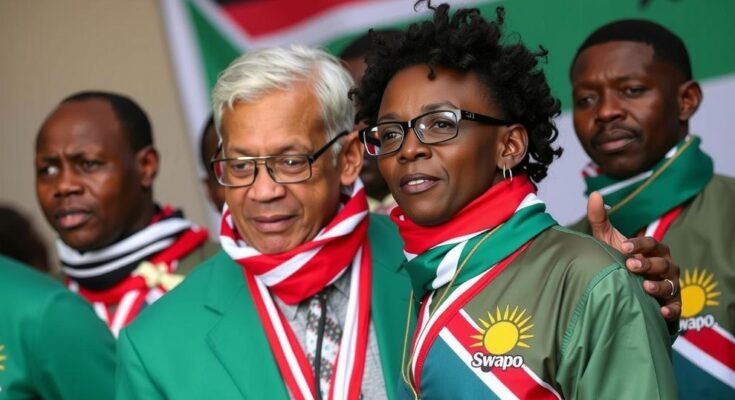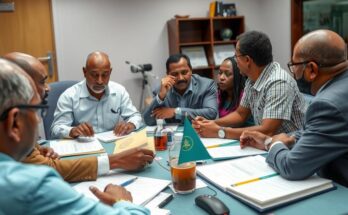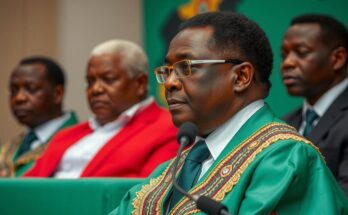Namibia’s ruling party, Swapo, faced losses in recent elections, reflecting broader trends in sub-Saharan Africa where many incumbent governments are experiencing significant challenges. Following an election marked by irregularities, opposition parties contest results. Economic struggles and rising discontent over corruption have empowered opposition parties, prompting unprecedented power shifts across the region in 2024.
Namibia’s ruling party, South West Africa People’s Organization (Swapo), remains in power after over 30 years, securing the presidency with 57% of the vote for Netumbo Nandi-Ndaitwah, who is now the country’s first female leader. However, the party’s hold has diminished, reflective of a broader trend in sub-Saharan Africa, where governing parties are experiencing significant electoral challenges. Various logistical issues and allegations of irregularities marred the voting process, leading opposition parties to contest the results vigorously.
In a notable political landscape shift, other African nations have also witnessed the decline of long-standing incumbency. Recent elections indicate an unprecedented year, where the governing parties either severely diminished their seats or relinquished power entirely. Economic downturns, rising corruption frustration, and a robust opposition climate have fueled this phenomenon. In Botswana, the long-ruling Botswana Democratic Party (BDP) suffered a substantial defeat, while Mauritius saw a complete political overhaul with the emergent opposition Alliance du Changement dominating the parliament.
Countries like Senegal and the self-declared Somaliland republic also report opposition victories, underscoring significant governmental vulnerabilities. Even though some governments, like South Africa’s African National Congress (ANC), have retained power, they have done so at the cost of substantial support—a stark shift illustrated by the ANC’s fall below 50% in available votes, marking a historically low point since 1994. The growing recognition among voters of corruption and economic mismanagement has empowered opposition parties, leading to substantial political transformations.
Despite the global trend toward democratic decline, the resilience demonstrated in African nations is noteworthy. Opposition factions have adapted, learning from past electoral defeats and employing sophisticated strategies to secure their electoral prospects. This year is poised to be pivotal for further power shifts, especially with upcoming elections in Ghana, which could symbolize a continued trend of opposition victories in sub-Saharan Africa.
International attention must now gravitate towards this region that is often viewed as challenging for democratic pursuits, as evidence suggests a remarkable capacity for resilience and political evolution.
The political environment in sub-Saharan Africa has undergone dramatic changes in recent years, with many incumbent political parties facing unprecedented electoral challenges. The case of Namibia is emblematic of this trend, where the Swapo party has held power for over three decades but recently exhibited vulnerability in the face of rising opposition sentiment. This broader trend documents how governance in the region is increasingly contested, impacted by factors such as economic hardship, public outcry against corruption, and a better-organized opposition landscape, leading to a notable shift in power dynamics across multiple nations in 2024.
The electoral outcomes across sub-Saharan Africa this year reveal a significant shift in political power and public sentiment. While Namibia’s Swapo holds onto power, its decline in parliamentary representation speaks to larger trends impacting incumbents throughout the region. Factors like economic mismanagement and public dissatisfaction with corruption are pivotal to understanding the weakening grip of ruling parties. These developments signal a potential redefining of political landscapes, suggesting a greater resilience and commitment to democratic principles among African voters.
Original Source: www.bbc.co.uk




